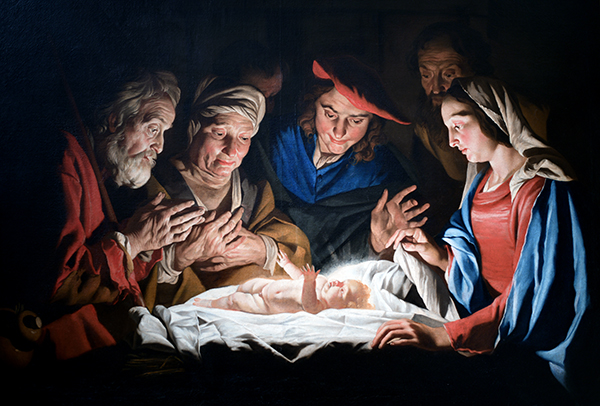God in a Box

Adoration of the Shepherds, Matthias Stomer: 1632.
by Timothy Teuscher
“Post-modernism” is a word used to describe our society and culture here in the 21st century. In a book I recently read on this subject as it pertains to the mission of the church, the author describes post-modernism in these words: “It is one of fantasy, irreverence, skepticism, materialism, relativism—and any other ‘ism’ one can think of, as well as indulgent, superficial, empty, uncertain, searching, and yet altogether unconcerned.” A rather sad, yet true, indictment of the times in which we are living, isn’t it?
I mention this because at no other time during the year does post-modernism become so pronounced and evident as it does at Christmas. Think about it for a moment…
Fantasy: The popular tales of Santa Claus and flying reindeer and snowmen coming to life; the seemingly endless television movies about recapturing childhood memories of Christmas and finding true love during this magical time of year—always, of course, with a light dusting of snow on Christmas Eve.
Skepticism: Jesus born of a virgin? Angels singing to shepherds? A star leading some wise men to the infant Jesus? Just a quaint fable invented by the early followers of Jesus. (But if this were so, one might wonder why St. Luke goes to such great lengths to emphasize the historicity of it all? )
Materialism: Christmas shopping, the ‘make it-or-break it’ time for most retail businesses; the season when people throng the stores to buy stuff they don’t need with money they don’t have.
Relativism: The message of Christmas reduced to vague platitudes about peace and love and good-will—and that’s about it.
When post-modernites today hear the words of those familiar Christmas carols that somehow still happen to fill the airwaves on the radio or in the shopping malls, they respond like the first-century post-modernite Pontius Pilate or the Greek philosophers who Paul met up with in Athens: “What is this babbling? God becoming flesh in the womb of the virgin Mary and being born in a manger? God sending His own Son into the world in order to die on a cross as the atoning sacrifice for the sins of the world? Why, that’s nonsense! That’s a rather narrow-minded, exclusive claim! Aren’t you, after all, putting God in a box?”
At least they have that part right, for that is precisely what Christmas is about: God in a box. After all, when God the Father sent His only-begotten Son into this world, where did He put Him? Was it not in a box—in the womb of the virgin Mary? When Mary gives birth to her firstborn Son, what does she do? Why, she puts Him in a box—“wrapped Him in swaddling clothes and laid him in a manger.”
Martin Luther explains it this way: “The Son of God did not want to be seen and found in heaven. Therefore He descended from heaven into this lowliness, came to us in our flesh, laid Himself into the womb of His mother and into the manger and went to the cross. This ladder He placed on earth so that we might ascend to God on it. This is the way you must take. If, however, you forsake this way and try to speculate about the glory of the Divine Majesty without this ladder, you will invent marvelous matters, matters that are far above you; but you will do so to your very great harm. People search for God everywhere; but because they do not search for Him in Christ, they do not find Him. And those who indulge their own thoughts and speculate about God and His will without Christ and apart from Him lose God altogether; for as Christ Himself says: ‘No one comes to the Father except through Me.’”
It has been more than 2,000 years since God put Himself in that manger box on the first Christmas. Unlike the shepherds, we cannot go to some stable and find “the Babe wrapped in swaddling clothes and lying in a manger.” Which begs the question: where can we go today to find the Christ Child, the only Saviour of sinners, and so receive those heavenly gifts of forgiveness and peace and joy and salvation and life forever?
The Reformer answers: “Christ has achieved it at the manger and on the cross, it is true. But He does not distribute or give it to us there. No, He distributes and gives it only through the Word and the Sacrament. If I seek the forgiveness of sins and my eternal salvation from Him, I do not run to the manger nor do I journey to the cross; for I will not find it given there. No, I will find it only in the Word and the Sacrament where alone God distributes, presents, offers, and gives it to me.”
Yes, in a box—that is where the Lord of heaven and earth, the Creator, the Savior of the world, Jesus Christ, is still to be found today and where He would give to you those heavenly, eternal blessings of His incarnation and birth, of His suffering and death; the box called the Word of God, the Holy Scriptures; the box called the holy Sacrament of His very body and blood.
———————
Rev. Timothy Teuscher is President of Lutheran Church–Canada.





